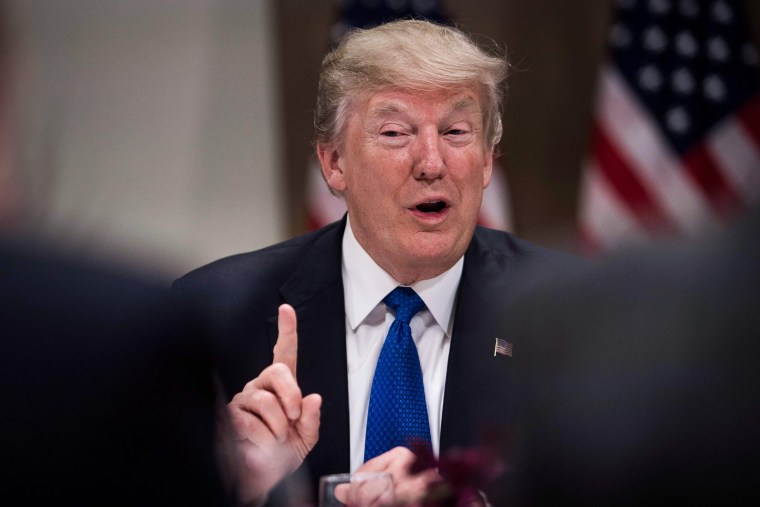Donald Trump raised a few eyebrows in March when he shared some thoughts on militarizing space. "My new national strategy for space recognizes that space is a warfighting domain, just like the land, air, and sea," the president said. "We may even have a space force -- develop another one, space force. We have the Air Force, we'll have the space force."
I guess he wasn't kidding.
President Trump mused again Tuesday about adding a new branch of the military -- a Space Force -- and this time made clear he is thinking seriously about it.Trump aired his thoughts during a ceremony at the White House, where he presented the Commander-in-Chief's Trophy to the U.S. Military Academy's Black Knights football team for its victories over Navy and Air Force.
The president told West Point cadets, "You will be part of the five proud branches of the United States Armed Forces -- Army, Navy, Marines, Air Force, and the Coast Guard. And we're actually thinking of a sixth, and that would be the Space Force. Does that make sense? The Space Force, general. You probably haven't even heard that. I'm just telling you now. This is perhaps -- because we're getting very big in space, both militarily and for other reasons, and we are seriously thinking of the Space Force."
I'm not altogether sure what "we're getting very big in space" means, but this is an issue that appears to be on Trump's mind quite a bit. At his campaign rally in Michigan last weekend, the president mentioned that the United States put a man on the moon, and quickly added, "By the way, excuse me, do you see how our space program is going? A little different!"
Different from what, he didn't say.
If Trump is seriously going to pursue this as a priority, it's probably worth noting a couple of relevant details. First, as the Washington Post reported, "The Outer Space Treaty, which the United States signed in 1967, bars states from testing weapons and establishing military bases on the moon and other celestial bodies. It also prohibits the placement of weapons of mass destruction in orbit around Earth."
This president has never felt especially obligated to honor international agreements, so I suppose this wouldn't be much of a hindrance.
But let's also not forget that Trump's bold vision for space appears to be at odds with Trump's earthly budget decisions. The latest White House budget plan, for example, makes significant cuts to investments in NASA.
What's more, some relevant projects that were advancing have suddenly been scrapped.
Months after President Trump signed a directive ordering NASA to return astronauts to the moon, the space agency has canceled its only lunar rover currently in development.According to Clive Neal, a University of Notre Dame planetary scientist and emeritus chairman of the Lunar Exploration Analysis Group, members of the Resource Prospector lunar mission were told to close out the project by the end of May."I'm a little shocked," he said. Neal, who is not directly involved in developing the mission, said he did not know the reason for the cancellation.... Officials did not offer a reason for the cancellation.
And yet, soon after, Commerce Secretary Wilbur Ross spoke at an event and shared the administration's vision for using the moon as "a type of gas station" for ships en route to other destinations, including Mars. Asked whether a gas station on the moon would happen in the next decade, Ross said it's coming "a lot sooner than that."
We're left to wonder what to believe: the Trump administration's ambitious bravado or the Trump administration's policy decisions. I'd recommend paying more attention the latter.
